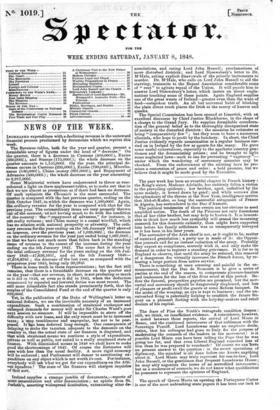The past week has been an eventful chapter in French
history : the King's sister, Madame Adelaide, has suddenly fallen a victim to the prevailing epidemic; her brother, aged, enfeebled by the same malady, is bowed down by grief; and while sorrows dim the splendours of the throne at the New Year, intelligence arrives that Abd-el-Kader, so long the successful antagonist of France in Algeria, has surrendered to the Due d'Aumale.
The political tendencies of these events are too obvious to need amplified notice. The death of the Princess not only foretokens that of her elder brother, but may help to hasten it. It is lament- able to think how much less sympathy will attend the mourning monarch for this domestic calamity, than might have supported him before his family selfishness was so transparently betrayed as it has been in his later years. The surrender of the Arab chief is not, as it ought to be, matter of unmixed gratulation ; a party use is made of it: the Opposi- tion journals call for an instant reduction of the army. Probably they expect no compliance, scarcely wish it, and only make the demand in order to register a standing grievance. It is for us in England to observe, that until the army be reduced, this removal of a dangerous foe virtually increases the French forces, by re- leasing a large portion from active service. There is something at once amusing and painful in the an- nouncement, that the Due de Nemours is to give a series of parties at the end of the season, to compensate pleasure-hunters and tradesmen for the loss of the fetes usual at this period. Be- fore the funeral, prospective gayeties are promised, lest the mer- curial and mercenary should be dangerously displeased, and loss of pleasure or profit swell the guests at some Reform banquet. In the midst of the weeping, an eye is kept to business ; and the un- entombed King is paternally helping to establish the future Re- gent on a pleasant footing with the holyday-makers and retail dealers of his capital.


























